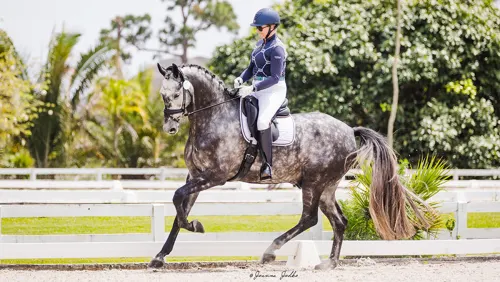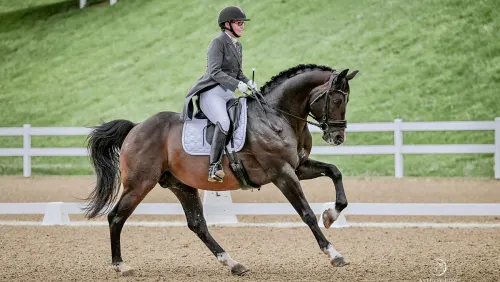We need to increase our depth of Grand Prix combinations to have any hope of success at future international championships.
London was in focus like never before, and what a fantastic show the Olympics were! The British people have every right to burst with pride, not only because they hosted probably the best Games ever, but also because their athletes excelled in every sport, including equestrian. They gave us all an unforgettable experience and an accomplishment to look up to in every way.
I like my job, but since the day I accepted the U.S. Equestrian Federation position as technical advisor to dressage almost three years ago, I wasn’t looking forward to the Olympic Games. Our lack of depth in the big tour loomed large, and short of manufacturing new combinations out of thin air, the prospects weren’t looking good. Things did not improve as time went by, comparing what we had at home to what was happening overseas. If there had been an option to sit this one out, I would have suggested it.
The trials correctly selected the best we had, and our riders did as well as they could with horses that couldn’t quite measure up to what Europe has produced lately. I was particularly impressed with how well Jan Ebeling presented Rafalca, keeping his focus in spite of all the hoopla around her and the presidential election.
Ravel did us one last of many favors and kept the team in a respectable sixth position. That was his final gift to U.S. dressage, and not until it was all about him did he lose his concentration and miss a couple of Steffen’s cues. He will now be retired, and I can assure you we will have occasion to lament the loss of the combination of Steffen and Ravel.
Once you become a member of the American dressage team, the USEF has a great support system in place. In 2011, the staff went to the test event at Greenwich, and we also traveled to several locations outside of London to find a stable where we could have our training camp. We settled for the lovely “yard” offered by Jack and Linda Keenan, who are expatriate Americans and the most wonderful, supportive and generous people on earth!
The 2½ weeks spent there were great for polishing final details, test riding and team building. The charming village of Hadleigh was welcoming and peaceful. The horses arrived in excellent condition, and our team veterinarian, Dr. Rick Mitchell, not only flew with the horses, but also was present for the entire time we were in England. And the team riders had the staff, their trainers, the team coach, the veterinarian and a sports psychologist available via phone.
With an impressive set-up like that, there was only one thing missing for the last three years: plenty of horses ready to compete at Grand Prix of the quality that is needed for success on today’s international scene. We have the riders, but with Ravel gone and very few in the wings, we have to be more critical of ourselves before sending another team out to fight windmills.
When you go to compete at the Olympics, the philosophy is that winning is not the essence, it’s how you play the game. We played well, and our riders were good ambassadors for our country, but because we had no chance at a medal it was at times frustrating and difficult to subdue the “go get it” instinct that lives within every true competitor and make do with “participating.” You can do your job and hope for a miracle, but you still live with reality.
ADVERTISEMENT
Where Are Our Next Grand Prix Horses?
The root of our problem is in our lack of depth and how we go about promoting the horse/rider combinations we would like to field on our team. I bet anyone who is well informed about American dressage would have a hard time giving me even four names of combinations they expect will represent us in Normandy (France) two years from now [at the Alltech FEI World Equestrian Games].
Ideally, we should be able to name 10 right off the top of our heads. That’s never happened here yet, but we’ve been stronger in the past.
Locating horses and riders coming up is the first obstacle facing us. If and when we find a precious few contenders, we don’t have much of a structure to offer them except clinics and a few limited USEF grants to support their education and competition.
What they really need is a controlled program that sends them overseas to stay long enough to compete against the Europeans. They need to compete in foreign arenas, in front of judges who can compare them with the horses that we must try to measure up to and hopefully surpass. Frequent showing on European terms until our riders become as seasoned in the ring as those of the nations we’re up against is of the essence. Our horses have to be seen repeatedly until the judges are familiar with them and know what to expect.
In short, our best combinations have to “live” and play overseas because our sandbox is not where the action is.
“Money makes medals,” said Prime Minister David Cameron in a TV interview, when he reviewed the success of the British athletes and the effect of the lottery money, which supported them with a total of 164 million pounds over the last four years. Almost $30 million went to equestrian. This was used to scout out talent and support it, as long as it produced results. The chosen riders could spend their time training instead of stressing about teaching, traveling to give clinics, trading horses, worrying about maintaining support of the horse or having to sell it. What a concept!
There must be some way to finance American equestrian athletes that will add to the private sponsorship, which has carried the burden alone for as long as I’ve been involved in dressage. These true and patient supporters of the sport have provided us with team members over and over again, but as we lose some of them, we aren’t gaining new ones.
And why should the same people be expected to repeatedly supply us with team horses without any additional support coming from neutral funds that could help riders without private sponsors? Even if one or two team members are fully sponsored, they need additional combinations to ride with them, and we have to find a way to financially support the riders who own their horses but have no sponsor.
ADVERTISEMENT
Without money, it’s impossible to make any long-term plan that makes sense, and without a plan that starts right now, we cannot expect to be ready for Brazil in four years!
It’s All About Attitude
For success both during preparation and in the Olympic arena, self-discipline is essential. Team thinking is of major importance. With a few shining exceptions, neither is a strong feature among our dressage riders, and feeling entitled really gets in the way of putting on your best performance when it counts.
I remember when Lesley Webb and I were on the Pan Am team in Argentina together, we were invited to fly to the opening ceremonies, which took place far from where we were staying. She politely declined the offer, saying she would have enjoyed it, but it would take too much time away from her riding, and she’d come to do her job for the team. And she did, plus getting the individual silver. It’s a lot about responsibility and attitude!
The combinations we brought to London were the best we had, and no other configuration would’ve changed the final result. With a couple of extra points, we would’ve stayed ahead of the Swedes, but a team medal was never within reach. We don’t want to be in that situation in four years. Looking forward, we need a European plan and money to support it.
But most of all we need quality horses and enthusiastic, energetic, team-oriented riders to train them, who are ready to sacrifice some of their comfort for the long-term goal of Olympic glory.
When you compete at a show, placing reasonably well can count to your advantage. At the Olympic Games, you have failed if you come home without a medal. But in the long run, the only real failure is the failure to try harder, and how we deal with failure is the real measure of success.
Anne Gribbons is the U.S. Equestrian Federation technical advisor for dressage. She has trained and shown 15 horses of her own to Grand Prix and competed in 10 national championships as well as in Europe, including the Aachen CHIO (Germany). Seven of her horses have been U.S. Dressage Federation Horse of the Year, and she was a member of the 1995 Pan American silver medal-winning team for the United States. Anne is a Fédération Equestre Internationale five-star judge, and she’s been a member of the FEI Dressage Committee since 2010. She started contributing to Between Rounds in 1995.
If you enjoyed this article and would like to read more like it, consider subscribing. The original version of “The Olympics Were Everything We Feared” ran in the Sept. 10, 2012, Olympics Analysis issue. Check out the table of contents to see what great stories are in the magazine this week.















